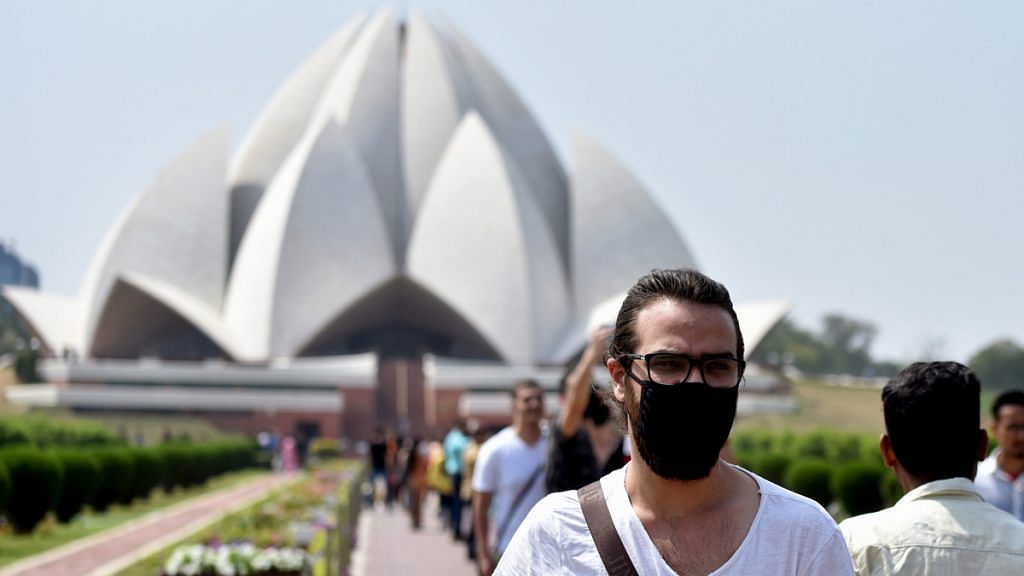India has cancelled tourist and other visas in a move to effectively quarantine the country’s population from the highly infectious coronavirus (COVID-19) spreading across the world. This is a step in the right direction.
Though it will hurt the hotel and travel industry, India does not have the public health capacity to cope with the spread of the coronavirus. We have just seen the case of Italy. The Italian government tried to put the concerns of the tourism business before the risk of the virus spreading, and the infection spread rapidly, putting the whole country at risk.
Initially, when the novel coronavirus hit China’s Wuhan, it was felt that the main impact would be a supply shock — imports from China that are essential for production around the world would be in short supply.
But what began with a supply shock to industries like electronics and automobiles has now turned into a full-scale possibility of a widespread demand shock across the world economy.
Also read: A coronavirus-driven global recession is becoming more likely by the day
Demand shock
As the world locks down upon travel, tourism and public events in an effort to socially isolate the highly infectious COVID-19, people will spend less and produce less. It is becoming clear that in many countries across Europe, America and Asia, including India, there will be a sharp and sudden demand shock. This will give a big negative shock to the GDP of many countries.
Our limited understanding of the virus and the uncertainly regarding when and how the world might be able to cope with its spread is affecting stock markets and investment. No one knows if the restrictions on travel and work will last for weeks or months. As a consequence, the economic impact of the virus is not well understood. Markets will remain volatile.
As workers in various industries across the world work from home, not only will their own businesses be affected, thousands of eateries, retail stores, cinemas, shopping malls, airlines, taxis and their suppliers will see a fall in incomes. As people earn less, they spend less. There will be a negative multiplier effect. India can ill-afford this.
If hopes that the oncoming summer will limit the spread of the virus turn out to be true, it will be great, but if that hope prevents us from preparing adequately for the infection, there will be a bigger disaster. While China seems to have been able to shut down many cities and provinces, it required a level of policing and monitoring and curfew-like conditions that other countries, including India, do not have.
Also read: MEA set to brief foreign envoys on coronavirus, will allay concerns over travel advisory
How other countries have reacted
Each country matters to the world economy in its own way. China was thought to matter mainly for its position in global production chains. Italy has a huge debt and its public finances affect international financial markets. Until a few days ago, its government was saying it is safe to travel to Italy, other than to the northern provinces, which are quarantined. Social isolation appears to have been left too late. Today, the entire country is in a lockdown.
Initially, the prospect of loss of business due to tourism, which is a large part of the Italian economy, was so scary that it seems to have prevented the leadership from properly assessing the inadequacy of the public health system. This appears to have led them to risk allowing greater movement at the initial stages of the spread of the disease, even though coronavirus cases were doubling every day.
The expected decline in Italian tax revenue and increase in expenditure suggest that the country may not be able to repay its debt, and given its size, this has made European and global financial markets jittery.
On the one hand, governments will suffer from huge health expenses for mounting a response in terms of testing travellers, quarantining them, and testing those with exposure to those who might have been infected. On the other hand, the sudden and sharp slowdown in economic activity will lead to a fall in tax revenue. India, for example, will see a decline in taxes imposed on petroleum products as people travel less, on GST collected from hotels, and other businesses. This means fiscal deficits will be higher and public debt will rise.
Also read: 83 evacuees from coronavirus-hit Italy create ruckus at Army facility, demand separate rooms
Limited space for fiscal, monetary measures
In response to the coronavirus shock, the US Fed and the Bank of England have cut interest rates. The UK and Italy have announced fiscal packages. But while most governments around the world are responding with fiscal and monetary measures, India has limited space to do so. Even if India does undertake expansionary monetary policy measures, the impact is likely to be limited. The transmission is poor.
Instead, understanding that public health capacity is limited and pushing social isolation and prevention is India’s best bet. This is what India is trying. Today, the infection is limited in its spread. If it can be contained to a few cases, the health system can cope. This is our best bet.
The author is an economist and a professor at the National Institute of Public Finance and Policy. Views are personal.
Also read: Coronavirus, Yes Bank failure, oil shock, slowdown – Indian economy has too many challenges
